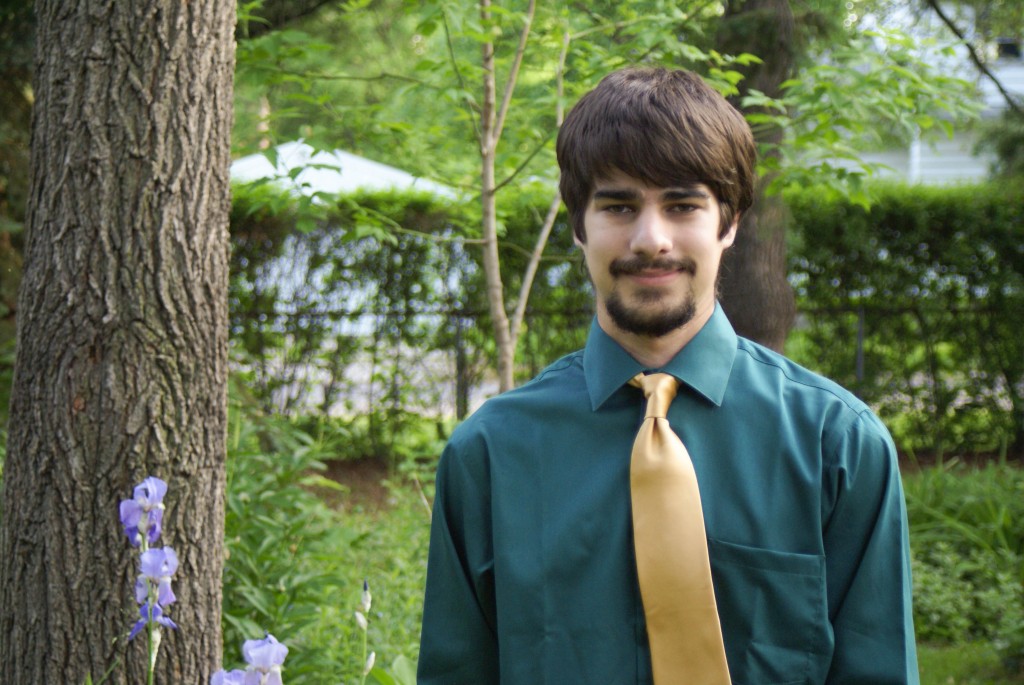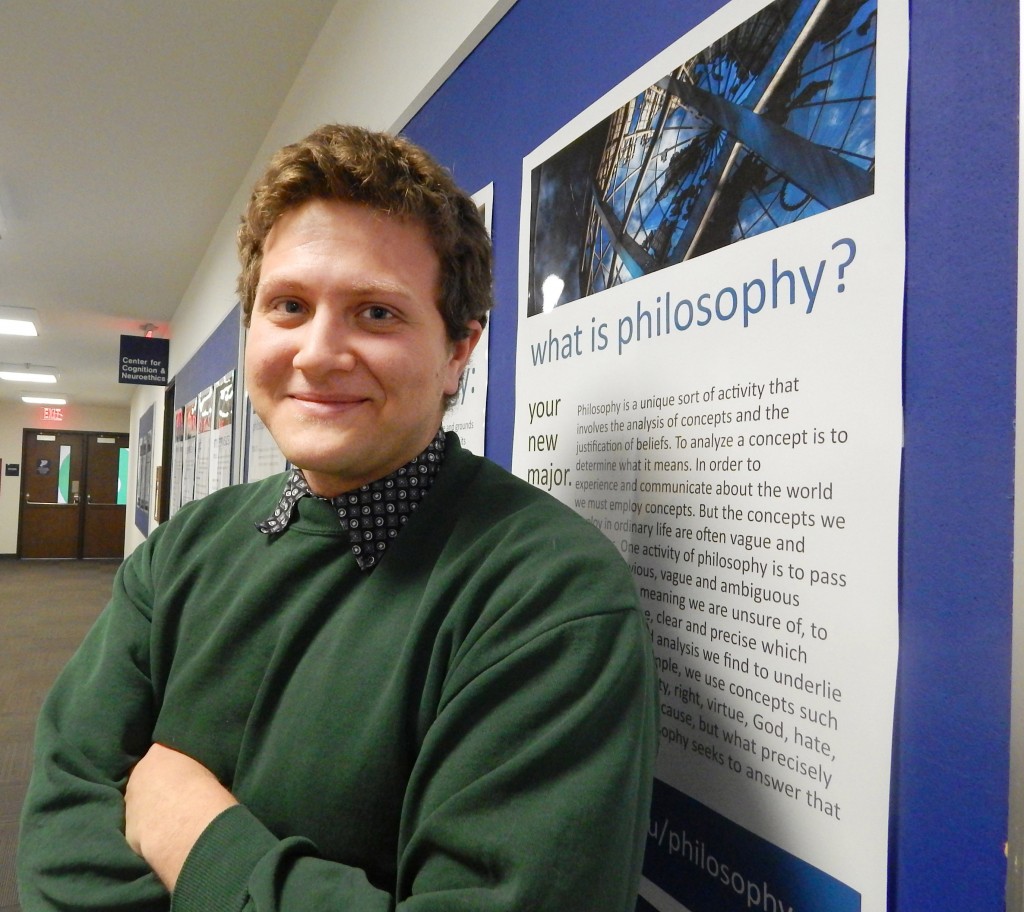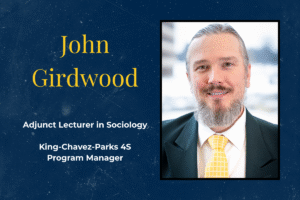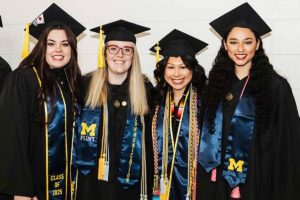UM-Flint Philosophy alums have a long history of finding success in their academic and career fields. Douglas Grattan and Thomas Mann, two recent graduates, are no exception as they have both been accepted into teaching assistantships with full tuition waivers and annual stipends as they pursue their graduate degrees at separate institutions.

Douglas Grattan (2014) will be heading to the Master’s Program in Philosophy at Colorado State University. In addition to his academic duties, he will be working on revisions to a book he’s written. When asked how he expects to spend his time at CSU, Grattan said, “As far as plans go, most of my time will be spent teaching or working, and in my free time I hope to finish the book completely and look at getting it published, as well as continue working on another book that I have in the works. Other than that, I hope to get involved on campus as much as possible and try to present at conferences whenever the opportunity arises. The time I don’t spend on all of that will be spent exploring the hiking the mountains, biking, and exploring the state.”
When asked how his time at UM-Flint and in the Philosophy Department prepared him for this next step in life, Grattan said, “Above all else, the philosophy capstone course was a huge boost for me—I was able to work on a literary review (that was eventually published online), intern at a philosophy conference, and at the end of the semester present a paper in a conference-style setting, which are experiences that I will have to repeat as a graduate student and which I thoroughly enjoyed. Beyond that, every philosophy class that I took was beneficial to me in some way, as I used many of the ideas that I learned within them as springboards for parts of my books and for other research projects. In many ways, I have used or will use everything that I have learned at UM-Flint, and I am eternally grateful for it.”
Grattan speaks of Dr. Simon Cushing as the faculty member who made the biggest impact on his time at UM-Flint. “[He] was by far my favorite professor. I enrolled in every class of his possible because he was extremely knowledgeable, approachable, interesting, and witty, so I always looked forward to his classes. I learned a great deal from him, and in many ways I wish to emulate his teaching style as both a graduate teacher and as (I hope) a professor later in life. In addition, while I was only able to have him as a professor in the capstone class, Dr. Stevens Wandmacher had much the same effect on me and gave me a great deal of encouragement.”
Grattan’s time at UM-Flint was not entirely spent in a classroom. “Part of the capstone class that I mentioned above was a two-month internship with the Center for Cognition and Neuroethics, which is a joint collaboration between the IINN in Flint and the philosophy department at the college. Through this, students in the capstone class are given the opportunity to do research on particular subjects that are of interest to those that run the institute, which they in turn incorporate into their medical practices or use as means towards further research, as the research is published online in the form of a literary review. This benefits society because the topics are of immediate importance to the medical field and beyond, given the fact that they have to do with questions of morality, patient rights, memory, personal identity, and much more. This was personally meaningful to me because not only was I able to make an impact in some way, but the topic that I chose to research opened my eyes to a great many topics and problems that, more than anything, led to my decision to specialize in applied ethics as a graduate student. It also became the genesis for the second book that I am currently working on.”

Thomas Mann (2015) will be heading to the University of Memphis for his philosophy MA this autumn. He also credits the faculty of the Philosophy Department for preparing him for this next step, “Certainly the philosophy department was extremely unique. Not only did the instructors do a wonderful job teaching, but they also got students to get excited in the subject. They also began the Michigan Undergraduate Conference and the undergraduate philosophy journal, which was very useful to me personally because it provided experience that very few undergraduates have.” When asked to describe the impact of specific faculty members, Mann said, “Dr. Cushing’s logic class for first getting me interested in philosophy, Dr. Veillet’s classes that gave me a perspective in philosophy I probably wouldn’t have been interested in otherwise; Dr. Wandmacher’s feminist ethics class and encouragement; Dr. Artis’ combination of history and philosophy, and Dr. Anderson’s classes that really got me thinking and writing better.”
Mann also found value outside of his first major’s department, “Also the history department was a big impact, especially Dr. Molnar, who not only took over the reins as my advisor but was always there for encouragement and guidance when I wasn’t confident I was much of a writer of history. There was also Dr. Kosnoski [of Political Science] and Dr. Lutzker [of Economics], who fostered and encouraged my interest in social theory, politics, and economics. I was also able to talk to Dr. Kietzman [of English] about the life and thought of some rather obscure figures, and that meant a lot to me as well.”
When asked about advice for incoming College of Arts & Sciences students, Mann said, “Do try and find what you love to do, what you are truly passionate about. And then try and find some other people who enjoy that as well. I would encourage this to be primarily academic, as it is an academic environment, but it can be extracurricular too. Sometimes students choose a major without a passion for it, or with an idiosyncratic passion for it, and it can die quickly if you think it’s too strange or too unusual. This should never be a reason to give up a/n (academic) passion! If there isn’t a club on campus, make one. If you don’t think anyone else is interested, ask around and see if there are majors in that subject. If nothing else, talk to a professor in the subject.”
Grattan added, “I would advise them to get involved as much as possible . . . and to get to know their professors. There are a multitude of opportunities on campus and within the city, as Flint is rebuilding and UM-Flint is a large part of that, giving students many unique chances to impact the community around them. In addition, professors are, in my experience, highly approachable and willing to give advice or help to students, meaning that they are invaluable to your education in a way that goes beyond just the classroom. Lastly, I would also advise them to open up in class, as many of my favorite memories at UM-Flint are the lengthy discussions within classes, as many of the professors strive to make their students part of the class and ask for their input rather than just lecturing. This allows for everybody to have a voice and hear many viewpoints or ideas that otherwise they would miss out on.”
To learn more about the Philosophy Department at UM-Flint and the ways in which they prepare students for their futures, visit their website. For updates and more news on alums and students, visit the Philosophy Facebook page.




